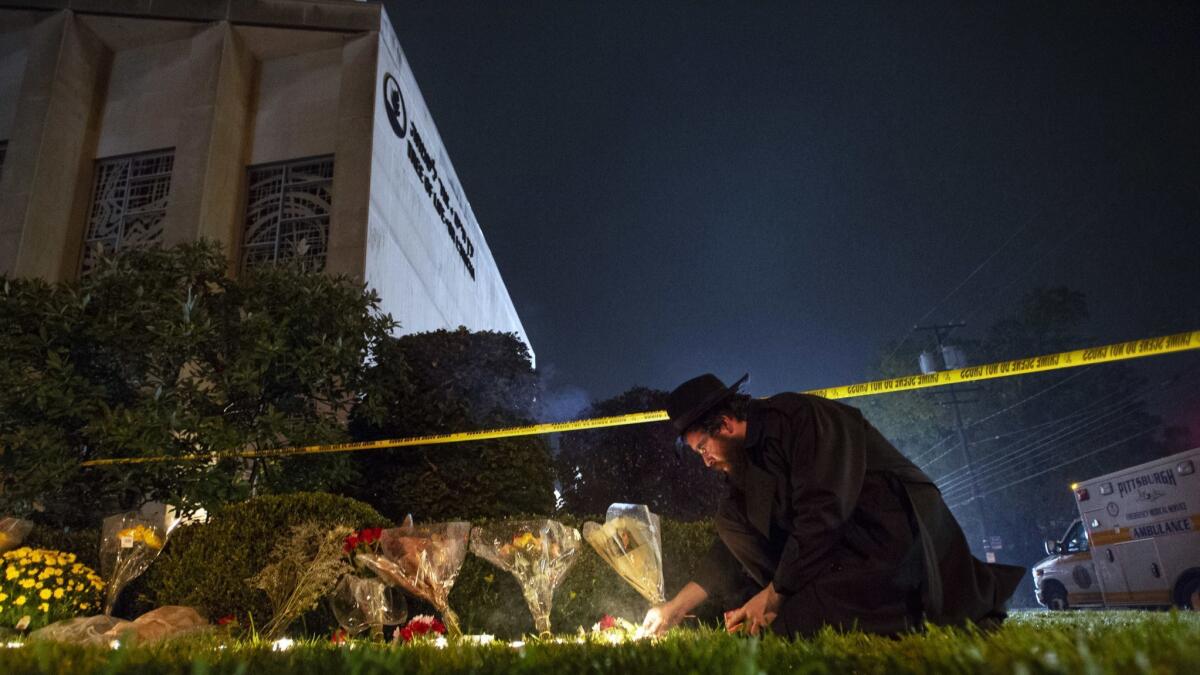Op-Ed: The Tree of Life Synagogue victims died so that refugees could live

- Share via
The Jews gunned down in the Tree of Life Synagogue died for a cause.
Whether they knew it or not, whether they supported the cause or not, they died defending the right of desperate people to find safe shelter.
Anti-Semitism, which is ancient, always appears dressed in the latest fashions. During the Spanish Inquisition, Jew haters latched onto the idea that Jews and Muslims were subverting the true faith. During the Russian pogroms, the haters decreed that Jews were dangerous socialists. During Josef Stalin’s purges, Jews were targeted as unrepentant capitalists. After World War I, when Germans searched for the reason for their defeat, Adolf Hitler provided one: the Jews.
“This plague is very protean and very durable and very volatile,” the late Christopher Hitchens said in a lecture he delivered at UCLA in 2010. “It appears in all ages and in practically all societies.”
“Just as you think it’s been eradicated, up it pops again,” Hitchens went on. “It’s exploded with or without the existence of the state of Israel, with or without Zionism, with or without finance capitalism, for which Jews were blamed, and with or without communism, for which, amazingly, Jews were simultaneously blamed — and, of course, in parts of the Arab world and elsewhere, with or without any Jews at all.”
Whether they knew it or not, whether they supported the cause or not, they died defending the right of desperate people to find safe shelter.
Now it has come to Pittsburgh, where an anti-Semite decided that Jews were behind what he believed to be the latest disaster befalling his people. Who is paying these refugees to come to his country? The Jews. Who is accommodating the refugees who finally make it here? The Jews.
Although the problem the Jews are accused of causing changes with the times, the solution stays remarkably constant: kill them.
The question, then, is not why there is anti-Semitism. It seems, as Hitchens said, to be a feature, not a bug, of Western civilization. The question is what sets off the anti-Semites.
In the case of the Pittsburgh terrorist, the early facts seem to point to his fear of Mexicans and Central Americans seeking refuge in the United States. It’s not impossible to figure out what stoked that fear. President Trump and right-leaning news outlets have zeroed in on the march of asylum seekers from Honduras and El Salvador as if it were taking place on the Washington Mall rather than 1,000 miles away.
Trump is sending armed troops to “protect” our borders from these 7,000 or so souls, who are approaching at the blitzkrieg pace of 2 mph. You’d think the destitute asylum-seekers were Santa Anna’s army, and America the Alamo.
The Pittsburgh terrorist was a Jew hater in search of a reason. I, for one, am very proud of the reason some Jews gave him.
He ranted about the Hebrew Immigrant Aid Society, an organization devoted to helping refugees of all faiths find their feet in a new country, as if it were Al Qaeda. The group dates back to before the turn of the 20th century, and it has a motto grounded in biblical precepts: “Welcome the stranger. Protect the refugee.”
For several years now, HIAS has organized a National Refugee Shabbat, encouraging Jews to gather and raise awareness about the global refugee crisis. Some 300 gatherings took place this month, in 33 states and in Canada.
The Pittsburgh terrorist — forgive me for not mentioning his name, but does he deserve even infamy? — somehow became inflamed by this act of justice and kindness.
But not all Jews are advocating on behalf of refugees. Those who work under Trump, or support him wholeheartedly, are trying to block the very pathways that enabled their own ancestors to come to America.
The architect of Trump’s draconian and cruel anti-refugee policy, Stephen Miller, is the Jewish great-grandson of indigent refugees. When Miller’s great-grandfather Nison Miller first applied for naturalization, in Detroit in 1932, the authorities gave a one-word reason for denying him: “Ignorance.”
The terrorist may have known about the Jews supporting Trump, or not. Irrationality is a defining aspect of anti-Semitism. Ignorance is another.
Enter the Fray: First takes on the news of the minute from L.A. Times Opinion »
In the UCLA lecture, Hitchens asked a provocative question: “Can anti-Semitism ever be considered flattering?” His answer was yes, and he cited as an example the Catholic anti-Semites of late 19th century France. They coined the term “intellectual” to deride those who came to the defense of Capt. Albert Dreyfus, a French Jewish army officer who was wrongly accused of treason.
“Let me say I hope that word ‘intellectual’ never loses its association with those wonderful things,” Hitchens said.
In the aftermath of the Tree of Life massacre, I find much comfort in Hitchens’ words. The very things that anti-Semites attack can help us define what we stand for, what matters to us.
The gunman seized upon Jewish aid for refugees because American Jews have a long history of supporting immigrants and refugees, their own as well as the oppressed and downtrodden from all over the world.
The Bible enjoins us not to forget that we were once strangers, and many of us, the majority, have not forgotten. Now it is our task to continue the fight, so that the tree of life may flourish.
Rob Eshman is the former publisher and editor-in-chief of the Jewish Journal.
Follow the Opinion section on Twitter @latimesopinion or Facebook
More to Read
A cure for the common opinion
Get thought-provoking perspectives with our weekly newsletter.
You may occasionally receive promotional content from the Los Angeles Times.










